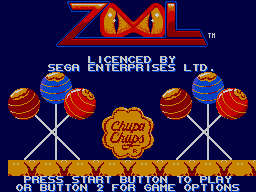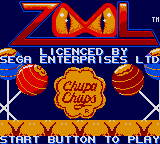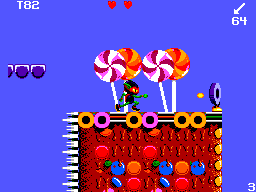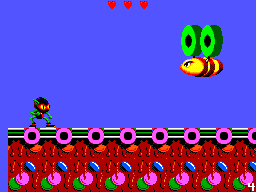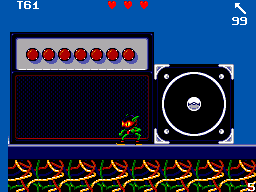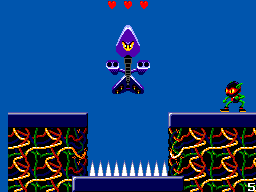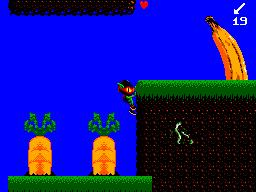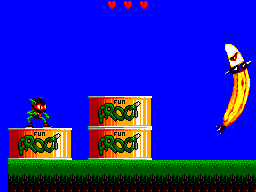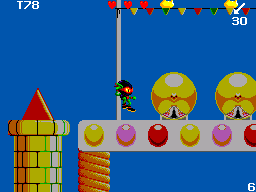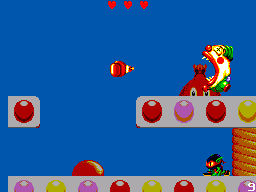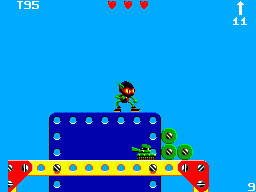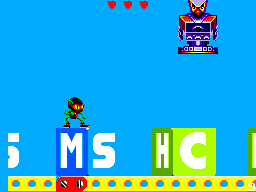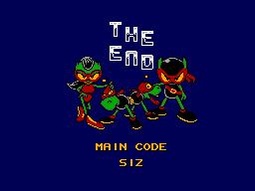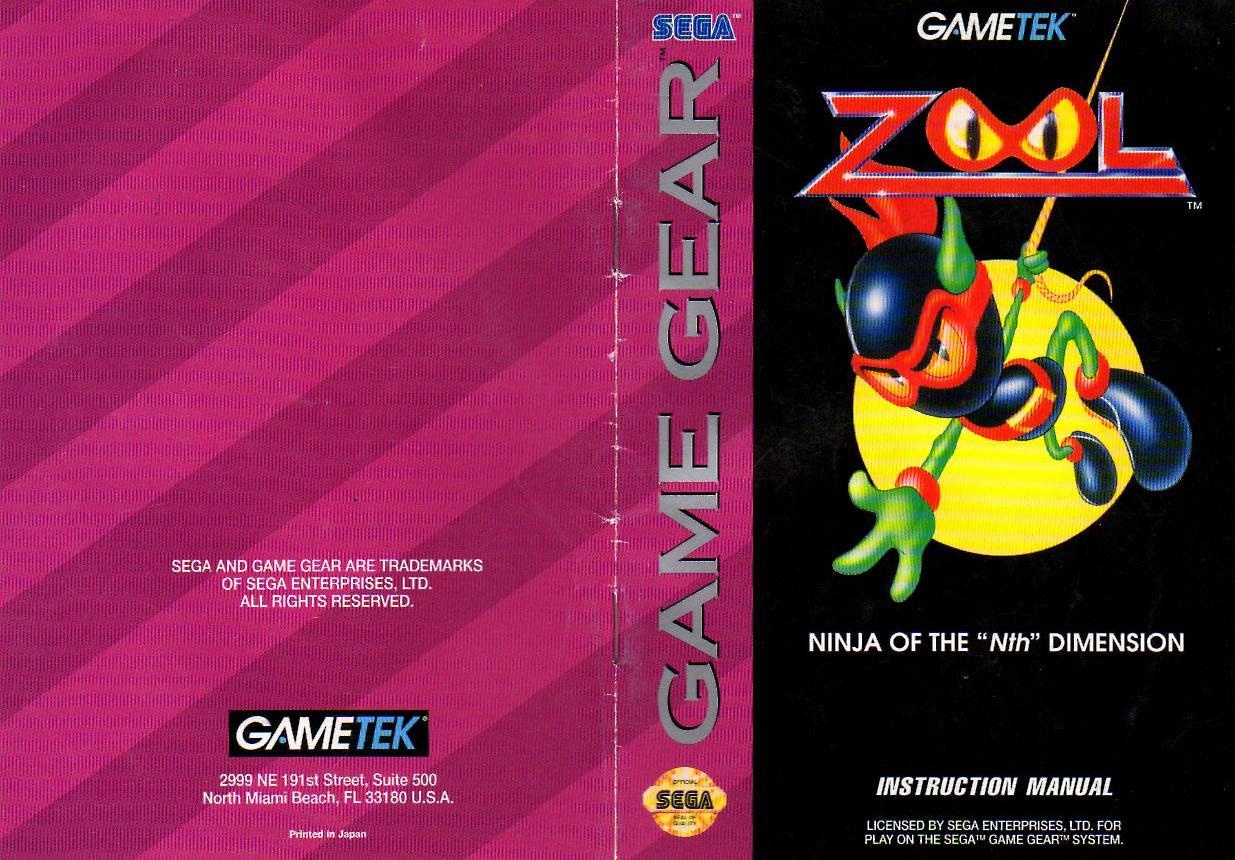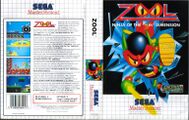Zool (8-bit)
From Sega Retro
- For the Sega Mega Drive version, see Zool.
| Zool | |||||||||||||||||||||||||||||||||||
|---|---|---|---|---|---|---|---|---|---|---|---|---|---|---|---|---|---|---|---|---|---|---|---|---|---|---|---|---|---|---|---|---|---|---|---|
| System(s): Sega Master System, Sega Game Gear | |||||||||||||||||||||||||||||||||||
| Publisher: GameTek (US) Gremlin Graphics Software (EU) Nisshou Iwai Infocom (JP) | |||||||||||||||||||||||||||||||||||
| Developer: Gremlin Graphics Software | |||||||||||||||||||||||||||||||||||
| Genre: Action[1][2][3] | |||||||||||||||||||||||||||||||||||
| Number of players: 1 | |||||||||||||||||||||||||||||||||||
| |||||||||||||||||||||||||||||||||||
|
Zool or Zool: Ninja of the Nth Dimension, known as Zool no Yume Bouken (ズールのゆめぼうけん) in Japan, is a platform game developed by Gremlin Graphics for the Commodore Amiga and ported to a number of platforms, including the Sega Master System and Sega Game Gear in 1994. The 8-bit versions of the game have different level layouts and music.
Contents
Story
While investigating a disturbance in the nth dimension, Zool is caught in a vortex and crashes his ship in a strange land. He learns that the evil Krool has conquered a number of worlds, including the one he has found, and that he must free these worlds from Krool's grip in order to make it back home.
Gameplay
The game is a platformer in which players control the gremlin ninja Zool. Zool moved with ![]() and
and ![]() and jumps with
and jumps with ![]() . He can defeat enemies by jumping on them. He can also attack by punching and shooting a ranged projectile with
. He can defeat enemies by jumping on them. He can also attack by punching and shooting a ranged projectile with ![]() . He can kneel with
. He can kneel with ![]() and does a kick and fires his shot with
and does a kick and fires his shot with ![]() +
+![]() . He continues punching or kicking by holding
. He continues punching or kicking by holding ![]() . He can fire his shot in mid-air by pressing
. He can fire his shot in mid-air by pressing ![]() after the apex of the jump. He performs a spin attack by pressing
after the apex of the jump. He performs a spin attack by pressing ![]() before or at the apex of the jump. He grabs on to walls when he jumps onto them and can climb them with
before or at the apex of the jump. He grabs on to walls when he jumps onto them and can climb them with ![]() and
and ![]() . He cannot climb walls by jumping up them in this version of the game. Pushing
. He cannot climb walls by jumping up them in this version of the game. Pushing ![]() while running does a sliding attack.
while running does a sliding attack.
The objective of each stage is to collect 99 items (whose design varies depending on the world), whereupon the goal reveals itself and an arrow in the corner of the screen points the way to it. Unlike the Mega Drive version, power-up items such as extra lives also count toward this total. Stages contain more items than are necessary to complete them.
Zool has three hit points and loses one whenever he takes damage from an enemy. When he runs out of hit points, he can only take one more hit before losing a life. Zool starts each stage with full health. If enemies are defeated when Zool is not at full health, they drop a flying heart that heals Zool for one hit point if he catches it. Each stage is timed, and Zool loses a life if he runs out of time. He retains all of the items he has collected if he loses a life.
Items
| Heart | |
|---|---|
| Restores a hit point for Zool. Dropped by enemies when they are destroyed if Zool is not at full health. It floats away and must be caught before it leaves. | |
| Bomb | |
| Destroys all enemies on the screen. | |
| Jumping Zool | |
| Temporarily gives Zool an enhanced jump. | |
| Shield | |
| Temporary makes Zool invincible. | |
| Two Zool | |
| Creates a "shadow Zool" that follows Zool and mirrors his movements, including his attacks, for a duration. | |
| 1-Up | |
| Awards the player an extra life. | |
| Goal | |
| Ends the stage. Only appears if the player has found the necessary amount of collectibles. |
Worlds
Each world contains four different stages, with the fourth stage solely consisting of a boss fight.
The level designs are different between the Master System and Game Gear versions.
| The Sweet World | |
|---|---|
| The Music World | |
| The Fruit World | |
| The Fairground World | |
| The Toy World | |
Versions
This version of the game is considerably more forgiving in difficulty than the Mega Drive version since there are not as many enemies, healing hearts are much more plentiful, and Zool has a long period of invulnerability after being hit.
Localised names
| Language | Localised Name | English Translation |
|---|---|---|
| English | Zool: Ninja of the Nth Dimension | Zool: Ninja of the Nth Dimension |
| English (US) | Zool: Ninja of the Nth Dimension | Zool: Ninja of the Nth Dimension |
| Japanese | ズールのゆめぼうけん | Zool no Yume Bouken |
Production credits
Master System version
- Main Code: Siz
- Additional Code: Richard Stevenson
- Music Composition: Patrick Phelan
- Sound: Krisalis Software
- Art: Michael Hirst, Ade Carless, Greggs, Pete Daniels
- Map and Level Design: Mike Lister, Michael Hirst
- Project Manager: Tony Casson
- Development Manager: James North-Hearn
- © Gremlin Graphics, 1993
Game Gear version
- Main Code: Siz
- Additional Code: Richard Stevenson
- Music Composition: Patrick Phelan
- Sound: Krisalis Software
- Art: Michael Hirst, Ade Carlesss, Pete Daniels, Greggs
- Map and Level Design: Mike Lister, Michael Hirst
- Project Manager: Tony Casson
- Development Manager: James North-Hearn
- Producer: Van Collins
- Packaging: Wendy Weber
- Manual Editing: Stacey Ruderman
- Art Director: Stephen Curran
- Production Manager: Sherry Kross
- Quality Assurance: Bobby King
Magazine articles
- Main article: Zool (8-bit)/Magazine articles.
Promotional material
Physical scans
Master System version
| ExpandSega Retro Average |
|---|
| 79 | |
|---|---|
| Based on 7 reviews | |
Game Gear version
| ExpandSega Retro Average |
|---|
| 75 | |
|---|---|
| Based on 14 reviews | |
Technical information
ROM dump status
| System | Hash | Size | Build Date | Source | Comments | |||
|---|---|---|---|---|---|---|---|---|
| ? | 256kB | Cartridge (EU) | ||||||
| ? | 256kB | Cartridge (US) | ||||||
| ? | 256kB | Cartridge (EU) | ||||||
| ? | 256kB | Cartridge (JP) |
References
- ↑ File:Zool GG EU Box Back.jpg
- ↑ File:Zool GG JP Box Front.jpg
- ↑ Jump up to: 3.0 3.1 http://sega.jp/fb/segahard/gg/soft_licensee.html (Wayback Machine: 2013-01-01 20:24)
- ↑ Jump up to: 4.0 4.1 4.2 4.3 4.4 4.5 Sega Magazine, "April 1994" (UK; 1994-03-15), page 100
- ↑ Sega Master Force, "December 1993" (UK; 1993-11-11), page 23
- ↑ Sega Pro, "April 1994" (DE; 1994-03-23), page 47
- ↑ Computer & Video Games, "July 1994" (UK; 1994-06-15), page 67
- ↑ File:Zool SMS credits.pdf
- ↑ File:Zool GG US Manual.pdf, page 9
- ↑ Joypad, "Novembre 1993" (FR; 1993-1x-xx), page 126
- ↑ Mega Force, "Décembre 1993" (FR; 1993-12-10), page 106
- ↑ Player One, "Janvier 1994" (FR; 199x-xx-xx), page 116
- ↑ Jump up to: 13.0 13.1 Sega Power, "April 1994" (UK; 1994-03-03), page 62
- ↑ Sega Pro, "April 1994" (UK; 1994-02-24), page 48
- ↑ Sega Master Force, "December 1993" (UK; 1993-11-11), page 22
- ↑ Jump up to: 16.0 16.1 Todo Sega, "Marzo 1994" (ES; 1994-0x-xx), page 92
- ↑ Beep! MegaDrive, "August 1994" (JP; 1994-07-08), page 23
- ↑ Consoles +, "Mars 1994" (FR; 1994-0x-xx), page 155
- ↑ Computer & Video Games, "April 1994" (UK; 1994-03-15), page 79
- ↑ Famitsu, "1994-08-05" (JP; 1994-07-22), page 42
- ↑ Game Players, "Vol. 7 No. 2 February 1994" (US; 1994-0x-xx), page 74
- ↑ GamePro, "May 1994" (US; 1994-xx-xx), page 132
- ↑ Gamer, "Ianouários 1995" (GR; 1995-xx-xx), page 1
- ↑ Joker, "Maj 1994" (SI; 1994-xx-xx), page 21
- ↑ Player One, "Mars 1994" (FR; 1994-0x-xx), page 108
- ↑ Sega Pro, "April 1994" (UK; 1994-02-24), page 57
- ↑ Sega Zone, "March 1994" (UK; 1994-02-24), page 65
- ↑ VideoGames, "February 1994" (US; 1994-0x-xx), page 86
| CollapseZool (8-bit) | |
|---|---|
|
Main page | Comparisons | Maps | Hidden content | Bugs | Magazine articles | Reception | |
- 1 player games
- EU Master System games
- All EU games
- UK Master System games
- All UK games
- Master System games
- 1994 Master System games
- All 1994 games
- Master System action games
- All action games
- JP Game Gear games
- All JP games
- US Game Gear games
- All US games
- EU Game Gear games
- UK Game Gear games
- Game Gear games
- 1994 Game Gear games
- Game Gear action games
- All games
- Bad translation
- Old technical information
- Zool (8-bit)
